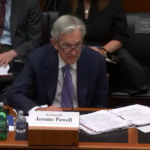On June 5, Congresswoman Maxine Waters (D-CA), Ranking Member on the House Financial Services Committee, and U.S. Senator Elizabeth Warren (D-MA), Ranking Member of the Senate Banking, Housing, and Urban Affairs Committee, acknowledged they wrote to the Federal Reserve Board of Governors to express their disapproval and concerns about the decision to raise Wells Fargo’s asset cap—urging them to change their mind.
Millions of consumers were impacted by a string of scandals that prompted the Fed to implement the growth cap since 2018, hence its poorly thought-out removal of the cap, “will have a profound impact on its credibility as an impartial, consistent, and effective bank regulator and steward of the banking and financial system,” they wrote.
“The misconduct is ongoing: in the last year alone, Wells Fargo has been required by the Office of the Comptroller of the Currency (OCC) to take “comprehensive corrective action” with its financial crimes risk management and anti-money laundering program after the OCC identified a range of violations related to the Bank Secrecy Act; sued by the CFPB for failing to protect consumers from rampant fraud on Zelle; and slapped with a $35 million fine by the Securities and Exchange Commission (SEC) for failing to act in the best interest of their investment clients,” the lawmakers noted.
Lawmakers cited recent alarming employee reports of discrimination and evidence that the bank is reverting to the irrational goals and sales pressure tactics that initially caused the bank’s problems, even as the bank announced plans to pay employees $2,000 to celebrate the lifting of the asset cap.

“The Fed’s decision to lift Wells Fargo’s asset cap despite mounting evidence that the firms’
systemic management failures persist is a direct giveaway to Wall Street at consumers’ expense.
It sets a dangerous precedent that a firm can defraud millions of customers and get away with it,” they expressed.
Lawmakers also described how the Fed must submit Wells Fargo’s exam reports for the past five years and other relevant documents to the Senate Banking and House Financial Services Committees if it does not change its course. This information is similar to what the Fed previously gave to the House Financial Services Committee during an investigation that was conducted a few years ago.
Congresswoman Waters, Senator Warren Sound Off
The lawmakers continued by highlighting how Congress will be better able to comprehend the decision to award the bank with this information in spite of the substantial public evidence that it has not addressed its systemic problems.
Regulators have taken the following measures against Wells Fargo for violating the law since last fall:
- In September 2024, the OCC issued an enforcement action requiring the bank to take “comprehensive corrective actions” with its financial crimes risk management and antimoney laundering program. The OCC found a range of law violations related to Wells Fargo’s Bank Secrecy Act internal controls, suspicious activity reporting, customer due diligence, currency transaction reporting, and other aspects of its anti-money laundering monitoring framework.
- In December 2024, the CFPB sued Wells Fargo, as well as JP Morgan Chase and Bank of America, for failing to protect consumers from rampant fraud on Zelle, violating multiple federal consumer financial laws. Despite an overwhelming volume of fraud complaints Wells Fargo failed to use that information to reduce fraud and failed to share the information with other banks on the network to prevent fraudsters from hopping bank to bank to perpetuate the schemes. Wells Fargo also failed to meet its legal obligation to adequately investigate consumers’ fraud complaints and remediate fraud and errors.
- In January 2025, the SEC slapped Wells Fargo Advisors with a $35 million fine for failing to act in the best interest of their clients enrolled in their cash sweeps program. In the settlement, the firm admitted to directing clients’ money to low-yield bank deposit sweep programs, from which it benefited handsomely while shutting its customers out from more competitive alternatives. According to the order, Wells Fargo, “failed to adopt and implement reasonably designed policies and procedures (1) to consider the best interests of clients when evaluating and selecting which cash sweep program options to make available to clients, including during periods of rising interest rates, and (2) concerning the duties of financial advisors in managing client cash in advisory accounts.”
The letter also explained how growth restriction has been a useful tool to direct the firm’s leadership toward resolving the fundamental issues that led to the “cross-selling scandal and other misconduct,” although authorities ought to have applied even harsher sanctions considering the systematic nature of the violation.
Waters & Warren plea:
“You should reverse this decision, and commit to lowering, or at least retaining, the asset cap until Wells Fargo has a clean and clear record of improved governance and an ability to avoid mistreating its customers. And when and if the Board does eliminate the cap, it should do so only after providing a clear, public, and legitimate rationale for doing so.
“To the extent you do not reverse this decision, at a minimum, you must identify the evidence that led you to conclude that the growth cap was no longer necessary. To do so, we request that the Fed provide the Senate Banking, Housing, and Urban Affairs Committee and the House Financial Services Committee with all Wells Fargo exam reports for the last five years, and any other relevant materials and evidence provided to or analyzed by the Board as it reached its conclusion. The Fed had previously shared supervisory information with Congress as part of its 2020 Wells Fargo investigation,10 so we expect you will be as responsive to this request. We ask that you provide access to this information no later than June 25, 2025. To the extent this information contains confidential supervisory material, we are happy to work with you to protect its integrity and avoid damaging disclosures,” they concluded.
To view the full hearing, click here.






